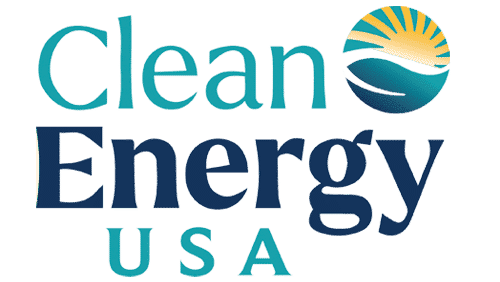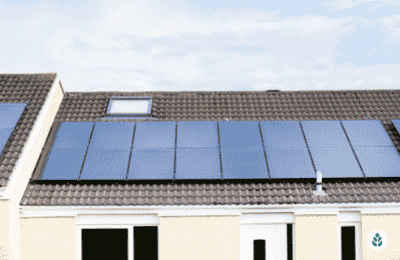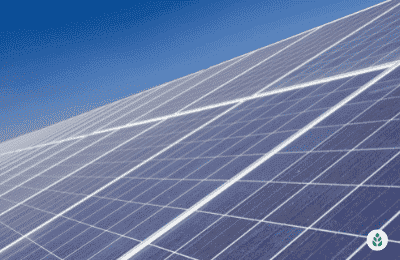
Is Solar Worth It in Delaware? (2024 Homeowner's Guide)
Here’s a quick overview of solar viability in Delaware:
- Delaware ranks 40th in the country for solar installations*
- The average electricity rate is 15.12 cents per kilowatt-hour**
- The average solar payback period is 11 years***
- Homeowners are eligible for utility-specific solar rebates and the federal solar tax credit (ITC)
- The average homeowner saves $33,236 over the lifetime of their solar system ***
*According to the Solar Energy Industries Association.1
**Data from the Energy Information Administration.2
***Calculated assuming the system is purchased in cash.
Each product and or company featured here has been independently selected by the writer. You can learn more about our review methodology here. If you make a purchase using the links included, we may earn commission.
Delaware is far from the most solar-friendly state in the country, ranking 40th out of the 50 states for solar adoption. However, residents can take advantage of relatively inexpensive solar equipment, smaller system size requirements and an abundance of sunlight that makes going solar a worthwhile investment for countless homeowners throughout the state. Below, you’ll find an in-depth expense analysis that will help you decide if solar is right for you, including how to calculate your estimated return on investment (ROI). We’ll also include some information on the benefits of installing solar panels in Delaware and some additional things you should keep in mind for the best experience possible.
To speak with an EcoWatch-vetted professional who can help you determine whether solar is worth it for your Delaware home, follow the links below.

Green Street Solar

Regional Service
Average cost
Pros
- NABCEP-certified technicians
- Locally owned and operated
- Many financing options
Cons
- Limited service offerings

Solar Energy World

Regional Service
Average cost
Pros
- Excellent reputation
- Independently owned and operated
- Offers products from leading manufacturers
Cons
- Some reported communication issues
- Less personalization than competitors offer

Clean Energy USA

Local Service
Average cost
Pros
- Excellent reputation
- Many years of experience
- NABCEP-certified technicians
Cons
- Slightly expensive
- Limited information available on website
Watch Below: Learn How Solar Energy Storage Works and Whether It’s RIght For You
How to Figure Out if Solar Panels are Worth It in Delaware
Installing solar panels is well worth the investment for many Delaware homeowners, but it’s not for everyone and won’t provide a return on investment for every home. Below, we’ll discuss some of the factors to consider to help you figure out if solar is a good option for your home and financial situation.
What’s Your Home Electricity Consumption?
Solar panel systems are sized according to a few factors, the most crucial of which is your monthly energy needs. Not only does your average power consumption affect the size of the system, but it also has a major impact on how valuable your system will be, as solar panels provide savings by reducing your energy bills. The more electricity you use, the more valuable your panels will be. It’s wise to check your energy bills for past usage averages. A good rule of thumb is that solar panels are worth it if you use at least 500 kWh per month. The average home in Delaware consumes approximately 932 kWh monthly, so most homeowners will benefit from solar installations from an energy consumption standpoint. There are some other things to consider alongside energy consumption, but this is one of the most significant factors that qualify your home for solar panels.
How Much Is It To Go Solar in Delaware?

What’s the Payback Period for Solar in Delaware?
One of the biggest perks of installing solar panels is that they almost always pay for themselves by saving you enough on energy bills to overcome the upfront fees. The timeframe in which this payoff occurs is called the solar panel payback period, and this is also the point at which your panels actually start saving you money. The longer your payback period is, the lower your total ROI will be. The average payback period in Delaware is just 11 years, which is right in line with the national average. Most homeowners in the state pay off their panels in 9 to 15 years. If you have a solar installer estimate your payback period or figure it out yourself using a solar calculator and it’s longer than 15 years, your panels will be less valuable overall than they are on the average home in your area. You’ll still likely save money in the long run, but the ROI will be lower than the typical $33,236 savings enjoyed by others.
What Are Average Buy-Back Rates in Delaware?
Most states have a net metering program or, even better, an energy buy-back program. These programs help solar customers offset the charges they’re hit with for pulling energy from the grid at night or during cloudy days. Delaware has an incredible net metering policy that mandates not only that the program be offered by local utility companies but also that the excess energy you produce will be purchased at the full retail rate. This policy ultimately helps homeowners in Delaware eliminate their electric bills, which provides more savings to pay back the system expense more quickly, allows you to start realizing a return on investment sooner and bumps up the total savings enjoyed over the lifetime of the system.
How Much Sun Does Your Roof Receive?
Solar panels only produce energy for your home when they are exposed to sunlight, which means the amount of sun your roof receives on a daily basis will be a determining factor when deciding if solar is right for your property. Delaware homeowners experience around 202 sunny days per year, which is just a touch below the national average of 205. This means most homes in the First State will receive plenty of sun to make solar panels worth the investment. However, you will need to do an assessment of your individual property to get a bit more accurate. Homes in the United States with south- and west-facing roofs will receive the most sunlight and are therefore best suited for solar panel installation. Additionally, you’ll want to look at shading on your roof from trees and nearby buildings. Significant shading will reduce the overall value of your solar panels, as it will reduce efficiency and, therefore, your savings.
What’s the Outlook on Solar in Delaware?
Solar is not the most popular energy source in Delaware, but the industry is expanding throughout the state, and solar adoption is increasing. This is due, in large part, to the solar-friendly policies in the area, including an excellent net metering program and the Renewable Portfolio Standard (RPS) goals, which aim to produce 25% of all energy in the state by 2026. Over the past decade, residential solar installations have fluctuated a bit in prevalence, but conversion rates are about as high now as they ever have been. Utility-scale solar and commercial solar have also grown over the last decade. Above all, it seems clear that solar’s foothold in Delaware will only grow in the future, potentially making solar equipment more affordable and policies even better for solar adoption.
Benefits of Solar Energy in Delaware
Going solar in Delaware brings homeowners a slew of benefits that are hard to pass up. We’ll provide some information on the most significant upsides of installing solar panels below.
Electricity Bill Savings
Most homeowners install solar to save money on their electricity bills, and that’s one of the most substantial benefits of going solar. Over the lifespan of your system, the panels are expected to pay for themselves in around 11 years in Delaware, after which they provide an average savings of $33,236. In actuality, that number will likely be even higher, as electricity rates are expected to continue to climb, as they have in the past. Installing solar panels makes you more energy independent and essentially allows you to secure a lower electricity rate for the 25+ years your panels are expected to perform.
Lower Taxes & Access to Other Incentives
Although Delaware ranks low in terms of solar adoption, it ranks very high when it comes to solar incentives. Residents will have access to incentives from both the state and federal governments, which makes going solar more appealing, accessible and affordable. One of the most substantial incentives is the federal solar investment tax credit, or the ITC. This is a tax incentive in the amount of 30% of your total system expense — an average of $8,721 in Delaware — that gets credited to your federal income tax liability. Some of the other solar incentives available to Delaware homeowners are listed below:
- Utility-Specific Solar Rebate Programs: Many local utility companies provide rebates for homeowners who install solar power systems to help reduce the upfront fees. Delmarva Power, Delaware Electric Cooperative and Delaware Municipal Electric Cooperative (DEMEC) offer three of the most appealing rebate programs in the state.
- Net metering: As mentioned above, the Delaware Public Service Commission mandates net metering for solar customers. It also requires local utility companies to buy back excess energy production at the full retail rate, making this one of the best perks for solar customers.
Home Resale Value Increase
Solar panels are expensive, but they provide a fairly significant bump in property value that makes up for a large portion of your total expense. According to nationwide data from Zillow, most homes that go solar will jump in value by around 4.1%.3 Given that the average home price in DE is $375,165, that’s an average value increase of around $15,381, instantly adding to your home equity.4 This jump in value could be more significant in more expensive areas, like New Castle and Newark. It’s important to note that your home value is not expected to go up if you use a solar lease or power purchase agreement to acquire your panels. Only cash purchases and solar loans will give you a value bump.
Clean, Renewable Energy
For many homeowners, one of the most significant benefits of going solar is the positive impact it will have on the environment. Not only will solar grant you some energy independence — especially given Delaware’s excellent net metering policy — but it will also reduce your carbon footprint, thereby helping to combat air and water pollution that result from a dependence on fossil fuels and global warming.
What to Look Out For When Considering Solar in Delaware
Converting to solar is a fairly straightforward process, provided you choose a reputable solar installer that has a history of successful installations in your area. However, there are still some things you’ll want to keep in mind throughout the process of switching to clean energy. We’ll include some information on some additional considerations below.
Upfront Fees

Payback Period
As mentioned above, your payback period is the time it takes for your energy savings to offset the expense of your solar panel system, ultimately making your solar energy system a smart investment. You can use a solar calculator or have a reputable solar company assess your home to get an accurate estimate for your payback timeline. In Delaware, the average payback period is 11 years, with most homeowners paying off their systems in 9 to 15 years. Your ROI will ultimately be lower than average if your period is more than 15 years, and it will take longer before you see a return.
Net Metering Policies in Delaware
Delaware mandates net metering for all utility providers, and the state requires that residents get credited for excess energy production at the full retail rate. Still, the net metering policies can vary between electric companies, so make sure to check with yours before you sign anything. For example, some utility companies will pay you for any excess power that you don’t use throughout the year, while others will just put the excess toward future utility bills.
Pending Policies & Changes to Incentives
The solar industry and green energy as a whole are constantly improving, and in states like Delaware that don’t top the list of the most solar-friendly, there’s a lot of room for growth. As such, policies and incentive programs can change without warning, so you should check for any updates before you commit to going solar. It’s usually not wise or financially beneficial to wait for better incentives to come along, but it’s good to know what you have available to you before you install panels.
Weather & Climate in Delaware
Delaware residents enjoy relatively moderate weather almost year-round, although some more extreme weather does hit during hurricane season on the east coast. Some homeowners worry about strong winds damaging their panels, while others are concerned cloudy days that are common in the state won’t make going solar a valuable investment. Generally speaking, the climate in DE is conducive to solar panels. The somewhat extreme weather experienced is unlikely to cause any serious damage, although opting for an equipment brand or installer that offers a good physical warranty isn’t a bad idea. Additionally, Delaware receives 202 sunny days a year, which is right around the national average and typically plenty to make panels worth it. Your solar panels will dip in efficiency on cloudy days, but there is enough sunlight throughout the year for many residents to eliminate their electric bills.
Companies Pushing Solar Leases or PPAs
Finally, you should be ready to avoid solar panel installation companies that push solar leases or power purchase agreements (PPAs). These options are far less beneficial than a cash purchase or solar loan. Leases won’t bump up your property value, they don’t let you take advantage of the federal tax credit, and they provide far fewer energy savings over time. You should also be on the lookout for companies advertising “free panels,” which aren’t really free and instead are just a marketing tactic to get you to sign a lease. There are even more nefarious companies in Delaware that are looking to scam you, so you really need to be careful to choose a reputable, vetted solar panel installation company. The Town of Smyrna has reported that several residents have been told by salespeople that solar is being mandated and that they must sign a lease.5 Delmarva Power has also had to inform customers that companies are posing as Delmarva representatives to push homeowners to convert to solar.6
Wrap Up: Is Solar Worth it in Delaware?
Going solar makes sense for most homeowners in Delaware, but it’s not an ideal or affordable solution for everyone. Figuring out if solar is right for you requires that you consider your estimated upfront fees, your monthly energy needs, how much sun your roof gets, the direction your roof faces and much more. You’ll also want to estimate your panel payback period to see when you’ll start to see a return on investment. Once you decide solar is right for you, you’ll still need to decide what purchase option or financing solution is right for you, how much you’ll save in the long run and the company you choose to handle the installation. We strongly recommend contacting a reputable and vetted solar provider in your area to figure out if solar is a good fit for your home and walk you through the entire process.
See also: See how much you can save by going solar with the EcoWatch Solar Calculator
Read More About Going Solar
- What Are the Best Delaware Solar Panel Companies?
- What Delaware Solar Incentives Are There?
- Find Cost Savings on Solar in Delaware
The cost information presented in this article is derived from a comprehensive analysis, incorporating data from multiple industry sources. The average cost per watt per state was calculated based on figures from Consumer Affairs, Energy Sage, and Berkeley Lab’s Electricity Markets & Policy Department. Additionally, monthly energy consumption and the average monthly cost of electricity were sourced from the U.S. Energy Information Administration, ensuring a well-rounded and accurate representation of the information presented.
Frequently Asked Questions
The EcoWatch team regularly gets questions from Delaware residents about the process of going solar and how to determine if it’s a good option. Below are some of the questions we see most often, along with our responses. If you have specific questions that aren’t answered here, reach out to our team of solar experts at solar@ecowatch.com.
The answer to this question will depend on many factors, including how much you typically spend on electricity in a month, how efficient your home is, the direction your roof faces, and much more. You can use a solar calculator to get a rough estimate of how much you’ll save and how long those savings will take to pay for your panels, but the only way to get a truly accurate estimate is to have an experienced installer assess your property. Most homeowners in Delaware pay off their panels using energy savings in between 9 and 15 years, with the average sitting around 11 years. This is right in line with the national average.
In most cases, yes, but you do need to confirm beforehand if solar is right for your property. Assuming you have around the average monthly energy bill of $140.92 and all other factors are about average for your home — including sunlight availability, system size, and more — you can expect to save around the average of $33,236 over the lifespan of your panels. These savings are enjoyed after the panels pay for themselves!
Yes, solar panels will boost your property value in Delaware. According to estimates from Zillow, the average home jumps in value by around 4.1% when solar panels are installed, which is an average increase of $15,381 in Delaware. Only panels installed using solar loans and cash purchases will cause this value increase; solar leases and power purchase agreements (PPAs) will not affect your home value positively.
Yes, permits are required to install solar panels on your home in Delaware. The permitting process adds a bit to your installation expenses, but it ensures your panels are installed and connected to the grid properly. Your solar installer will likely handle the entire permitting process for you so that you don’t have to worry about filing for permits or final inspections.
While it’s possible to DIY solar panel installation in Delaware, it’s not recommended. Installing panels is dangerous and can lead to expensive mistakes, so the potential savings on labor typically isn’t worth the risk. We recommend leaving the work to licensed and insured professionals who have the experience to get the job done correctly.
Top Solar Installers in Delaware Cities
Comparing authorized solar partners
-
- NABCEP-certified technicians
- Locally owned and operated
- Many financing options
- Limited service offerings
A+Outstanding Regional Installer
Having trouble deciding? Click below and use our process to receive multiple quotes instead:

 233k
233k  41k
41k  Subscribe
Subscribe 


